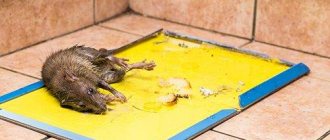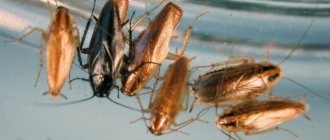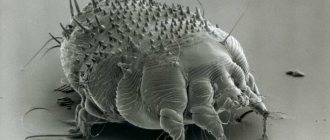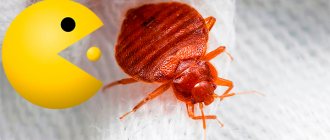How to protect the cellar from rodents. Extermination of basement rats
Quite often, residents of houses with a basement or cellar are faced with rodents that enter warm rooms in search of food.
It is quite difficult to fight this small scourge - they are very cunning and careful. All basement rats and mice have a highly developed instinct of self-preservation. Fighting them will require special means and considerable effort, but they cannot be allowed to live in the basement of the house - the consequences can be catastrophic. There is a lot of information in open sources on the Internet, including photo materials, about how much harm and damage these harmless animals can cause.
In order to get rid of rats in the basement, you will have to carry out a rather troublesome process, and the matter is complicated by the fact that one or another method does not work in all cases. Therefore, for a successful fight, several methods are used simultaneously to completely exterminate the entire colony.
Rats in the basement are very tenacious and tend to hide in the cracks of the house, crawling through minimal openings, literally the size of a ruble coin.
Rodents can be found especially often in the cellar in winter, when they seek to find a warm place. Gnawing holes even in concrete walls, they do not disdain metal crossbars. Even with a great love for animals, it is still worth thinking about how to get rid of mice in the cellar, since the damage they cause is too significant.
Numerous photos of owners affected by their invasion are the best confirmation of this. We can say that there are practically no obstacles for them.
A rodent in a cellar will leave it only when unfavorable conditions for living and reproduction arise. It is necessary to close all possible entry points to burrows and limit access to food products. The lack of food, one way or another, will significantly reduce the number of rats, and their reproduction will also stop. The remaining individuals die on their own.
Experts recommend covering doors and windows in basements or cellars with metal sheets, carefully sealing windows and pipe openings, as well as ventilation vents through which rodents can freely crawl. These methods will not immediately help get rid of rats, so they are rather preventative. For complete extermination it is necessary to apply a whole range of measures.
Preventive measures
When the owner, having visited the cellar, discovers that the mice in the cellar are gnawing potatoes and spoiling food and things stored for the winter, digging passages in the walls and making nests to hatch out the little mice, then he will be faced with the problem of taking urgent measures to destroy them. You can worry in advance and prepare the cellar for winter.
Before the start of the winter season, before filling the cellar with food, it is recommended to take preventive measures that will help prevent rodents from entering the basement:
- It is better to cover the doors to the cellar with a metal sheet;
- cover the ventilation outlets with mesh or metal with small holes; it should be taken into account that small mice are quite capable of crawling into small holes the diameter of a pencil;
- If possible, close all products in airtight containers with tight-fitting lids.
All these measures will be effective only if the cellar has concrete or brick walls through which rodents cannot crawl.
Getting rid of rodents is difficult. They have already adapted to all human tricks and are very tenacious. Therefore, it is easier to carry out preventive work to create unfavorable conditions for rodents than to fight them in the future.
As preventive measures we recommend:
- concrete the floor;
- cover all the cracks;
- install a metal door;
- glaze the windows;
- remove trash;
- make sure that the holes in the ventilation are no more than 50 mm.
These measures are aimed at preventing rodents from entering the cellar. It will not be possible to get rid of them if the pests have already entered the storage facility.
This closeness of rodents to humans is explained by large food reserves. The gray rat is a predator; more than 60% of its diet consists of food of animal origin. At the same time, it is a very adaptive creature: when it finds itself in an urban environment, the rat eats absolutely everything it finds.
They are attracted to garbage dumps under houses, working garbage chutes, and dampness in basements. Papers, food packaging, scraps and other waste are the optimal breeding ground for millions of rat armies.
Rodents penetrate high-rise buildings without problems: neither concrete nor fear of humans stops them. Rodents move through ventilation shafts, drainage and sewer pipes and in the space between them. They are able to enter a home through any gap, and if there is none, they will gnaw out a passage in the floor, insulation, or concrete floors.
If rats are already infested in the basement, they will soon crawl into residential apartments, gnaw through countless passages, occupy edible supplies, and, quite possibly, introduce some dangerous disease.
Sometimes a problem may not arise if, anticipating the danger of its occurrence, you take some necessary measures. If we think logically, we can conclude that rodents will not appear in a house if the living conditions in it turn out to be unfavorable for them or if entry into it is too difficult. The lack of food will also dissuade animals from entering basements.
You can protect the cellar from mice if you cover the doors on both sides with metal sheets, seal all the windows, and make the holes in the ventilation minimal. This method will help get rid of mice and rats in winter, and at the same time the room will be insulated to some extent.
A poisonous herb, soaked in boiling water and hung in the cellar, such as the above-mentioned blackroot, common elderberry or wild rosemary, can effectively fight rodent pests, but we must not forget about safety rules; it is necessary to devote a small, most necessary amount of time to this method.
Based on the methods mentioned above, you can understand how to protect the cellar from mice.
How to get rid of rats in a barn?
Rats are dangerous rodents and carriers of a large number of diseases. They are dangerous not only for people, but also for pets. In addition, they are very cunning. Catching them is very difficult. But, if there are rats in the barn, it is necessary to get rid of them, otherwise they can cause serious harm to both livestock and feed supplies. How to get rid of rats in a barn?
Why are rats dangerous?
Every year, rats cause irreparable damage to agriculture and livestock farming. Losses amount to millions. Consumed grain reserves, infection of large and small livestock, poultry, and the list goes on for a long time.
The most dangerous thing is that they are carriers of plague and encephalitis. Moreover, getting infected from a rodent does not present any difficulty. Infection occurs through bites, saliva that remains on the food of domestic animals, and parasites that live on their fur. These diseases affect the heart and lead to death.
They are also carriers of hepatitis, tularemia, giardiasis, etc. An interesting fact is that the pet itself may not get sick, but become a carrier of the disease, which in turn is transmitted to humans.
Therefore, when you find these uninvited guests in your barn, you need to start fighting them as quickly as possible.
Rats harm agriculture
What to expect from such a neighborhood?
The barn is the most favorite habitat for rodents. You can meet them there much more often than in a house or apartment. This is not surprising: optimal air temperature, constant availability of a source of food and drink.
But such a neighborhood is very dangerous:
- destruction of agricultural reserves (grain, fruit and vegetable supplies);
- infection of livestock and poultry;
- if there are electrical wires in the barn, then rats may well become a source of interruptions in the operation of electricity, or lead to its short circuit, and, accordingly, to the outbreak of fires (in rural areas such cases are not uncommon);
- they can carry young individuals or newly hatched chicks or ducklings;
- scare cattle (as is known, even adult cattle are afraid of rats).
Rodents are partial to wiring
What will happen if you do nothing?
If pest control is not started in time, they can cause serious damage to households and livestock. The most important thing is to start fighting in a timely manner, as soon as you notice rats in your barn. Rodents reach adult age in 4-5 weeks. Accordingly, new offspring will appear every 1-1.5 months. However, extreme cold or heat can reduce their sexual activity.
The brood can range from 2 to 20 individuals. Dealing with so many rodents is much more difficult.
Comprehensive measures to combat rats
All means are good in the fight against rodents. The problem that has arisen needs to be solved comprehensively: from folk remedies known for centuries to modern scientific inventions. We list the main methods aimed at fighting rats:
| The effectiveness of these measures | |
| Cats are rat catchers | Since ancient times, a cat has been housed in a barn with livestock. But it’s worth remembering that not all cats are suitable for this, but only special breeds. It is unlikely that a cat will be able to catch all the offspring, but it is quite suitable for prevention and for reducing the activity of rodents. |
| Traditional methods (various types of herbs, ash, special mixtures that are laid out in corners where pets have no access) | Folk remedies have proven to be effective in the fight against this scourge, but it is worth remembering that rats are not only cunning, but also have the ability to mutate and become addictive. That is, many folk remedies simply do not work on them. Therefore, the effectiveness of this method can be considered average. |
| Chemical industry products (various poisons, mixtures) | The effectiveness of this remedy is high. Because The chemical industry is constantly releasing new compounds to which rodents have not yet developed an addiction. But there is one drawback - the poison does not act immediately, but after some time, from 10 to 30 hours. Those. the corpses of rodents will be difficult to find, and the smell they emit is strong and unpleasant. |
| Special glue | The principle of operation is based on the fact that, having sensed the bait located on the surface of the glue, the rodent simply sticks to it, unable to independently detach itself and run away. Efficiency can be assessed as high. |
| Rat traps | The effectiveness of this mechanical means is low. Luring a rat into a trap, even with food, is very problematic. |
| Ultrasonic repellers | The development of a modern market can be considered a very effective method. The device emits ultrasonic waves that are perceived only by rodents. But keep in mind that as a result of this fight, the rats will not die, but will simply leave your territory. |
| Specialists of the FEZ of your region or services carrying out sanitary treatment of premises | This method is expensive, but very reliable. Especially if your shed is located on a large area. |
Destruction methods
All methods of exterminating rodents can be divided into 3 categories:
- chemical – use of toxic chemicals;
- mechanical - placement of various traps;
- biological - the use of natural enemies of rats and mice, that is, cats.
An experienced backyard hunter will provide assistance in the fight against a rodent infestation.
Next, you will learn how to get rid of rats from the cellar or basement that have already entered your home.
- One of the most popular methods is to use folk remedies or chemical products aimed at killing rodents.
- The use of ash gives excellent results. It is known that mice never settle in a building that has recently been on fire. This is because the ash irritates their paws and mucous membranes. To eliminate pests, try covering the floor of the cellar or basement with a thin layer of ash. Please note that this method has a serious drawback. Animals will spread ash throughout the house, and you will need to do some deep cleaning.
- No less effective is the use of a rat-catcher cat. Natural enemies of rodents are also some dogs (especially fox terriers) and hedgehogs. Keep in mind that your cat will help you get rid of rats in the basement only if you limit its diet as much as possible. This method is considered effective only for small spaces - apartments and private houses.
- Setting traps often helps solve the problem. But unfortunately, ordinary mousetraps do not always work. If they do not bring any benefit, we advise you to quickly switch to another method.
- Special mention should be made of ultrasonic rodent repellers. This remedy can be classified as a humane method of pest control. The device emits special rhythmic and ultrasonic signals, forcing rats and mice to leave your cellar or house and look for new housing. The undoubted advantage of such devices is their absolute safety for children and pets.
The most humane way to deal with rats and mice is an ultrasonic repeller.
Next, we suggest that you familiarize yourself with more detailed information about some of the described methods.
How to get rid of mice in the cellar using folk remedies. Chemical methods
Rats in the basement can be removed using special pesticides. There are three types:
- Chronic action.
- Instantly fatal.
- With the effect of embalming the animal's body.
All these substances answer the question “How can you poison mice in the cellar?” Chronic chemicals cause the death of the animal a few days after consuming the poison. The rodent's relatives will not be able to understand what is going on, and will also gradually die.
If you use instantly killing poisons, then in this case it is worth finding out approximately how many rats and mice are in the basement: if there are too many of them, then after the death of several individuals the rest will understand what is going on and will stop touching food with poison.
When using chemicals with the effect of embalming a corpse, the body dries out. The skeleton is preserved for a long time without emitting an unpleasant odor. You can easily remove the remains yourself or leave this task to the ants.
Here are the basic chemical methods for getting rid of mice and rats.
How you can get rid of rodents in a cellar using folk remedies can be suggested by various cunning traditional methods, among which there are many effective ways to solve such a serious problem.
The scattering of wood ash irritates the animals' paws, and then the rodents try to lick them. As a result, irritation also appears on the tongue. Powerless, the animal will run away from the cellar.
Sawdust mixed with mothballs will repel rodents for a long time if this product is placed around the perimeter of the entire basement.
Mice cannot stand the smell of burning fur, so it is worth burning a piece of fur from some pet in the cellar. Rodents must leave the room immediately.
With the help of the scent of chamomile, you can get rid of the animals once and for all - you just need to place the dried flowers along the walls where there may be holes, as well as in the corners.
The smell of clove oil, as the folk method suggests, is perceived by mice as dangerous, as a result of which they avoid the unfavorable place.
Blackroot, also called rat racer, causes serious discomfort to rats and mice: animals cannot stand its smell, but for humans, on the contrary, it is invisible, although it poses a threat to his health. This method should be used carefully and once - hang the soaked roots in the basement, and after the rodents leave, ventilate the room.
Nutmeg, fish oil, mint - these and many other substances will be equally useful in the fight against mice and rats that have infested cellars and basements.
The fight against mice in the cellar can be carried out using not only toxic substances, but also with the help of sounds harmful to these animals. Let's look at the main methods of using them.
Since rodents are shy animals, you can clearly understand what mice are afraid of. For example, they are afraid of human smell. But they are also wary of the harsh sounds that sound systems make at full volume. However, please note that the mice will most likely return after the hardware is turned off.
On the contrary, ultrasounds, which are not detected by the human ear, will help completely drive mice out of the basement. The animals, in turn, clearly hear these frequencies, which puts them under nervous tension. It is necessary to keep the device turned on constantly, then the rodents will leave the basement in 2-3 weeks.
How to destroy rats in the cellar when it is not possible to buy special equipment or any expensive chemicals? The answer here is quite simple - you can use pets for these purposes. What pets can help remove rodents from their temporary habitat once and for all?
- Ferrets.
- Hedgehogs.
- Some dog breeds.
- Cats.
As can be seen from the list, animals that hunt rodents can be found in any household or even in urban dwellings, so it is not at all necessary to purchase a specific “predator” to clear the basement of pests.
Cats are the most commonly owned pet, and for good reason – they are both affectionate and good hunters. If you limit their diet, they will be forced to get food in some other places and will be able to find food in basements where mice have infested. The person will get rid of a serious problem, and the pets will be well-fed.
There are two types of mechanical methods:
- leading to the death of the pest;
- humane.
They are used only if the number of rodents is insignificant. Mice, with the help of a special enzyme in their urine, are able to signal danger, which can reduce the effectiveness of these methods of killing mice.
Mechanical method
If, after all, there is a rat in the cellar, you can get rid of it by installing special devices such as a trap or rat trap. The aroma of the bait placed in it will help attract a rodent to a mechanical device. It is enough for the animal to lightly touch it, and the trigger mechanism of the device will automatically work.
On a note!
A mousetrap is often used to catch mice. If you need to get rid of a pig or a gray rat, then it is preferable to use a rat trap.
You can also catch a rat in the cellar using a glue trap, the principle of which is based on the use of special glue against rodents:
- The adhesive is applied to the cardboard surface.
- In the middle part of the structure, bait is placed, which serves as a piece of bread, meat or lard, as well as seeds or nuts.
- The smell of the treat will attract the rodent, but once it steps on the sticky surface, it will no longer be able to free itself.
How to store potatoes from rats. Stages of potato harvesting
Harvesting tubers consists of several stages:
- Digging potatoes;
- Drying tubers;
- Transportation (or transfer to the storage location);
- Bulkhead, sorting;
- Bookmark for storage.
The last stage can vary greatly. This depends on the gardener’s capabilities (availability of storage) and his preferences.
Some people have a cellar, others only have a balcony for storage.
You can store tubers in pits, and if there is a large quantity and space available, you can build trenches.
Digging up potatoes
It’s easier, of course, to dig potatoes mechanized: with a walk-behind tractor. But not everyone has such a mechanism.
And the areas under potatoes are generally small; you can handle them with a shovel or a pitchfork.
Therefore, we harvest potatoes using these two ancient, but relevant, methods.
What exactly is up to the grower to decide.
They try to grow potatoes on light soil; if this is the case, a pitchfork will do the job. Dense soil is too much for the forks; they may break or fail to turn out the bush properly.
In dense areas you will have to dig with a shovel.
Task: select all the potatoes, if possible, and preferably whole ones. It’s not 100% possible, but you have to strive.
Damage is inevitable: a shovel sometimes cuts a tuber, a fork sometimes punctures it.
That’s why it’s so important not to overexpose the harvest: while the tops are visible, it’s easier to navigate.
Procedure:
- The bush is dug up with a shovel or pryed up with a pitchfork, and then the tubers are picked by hand. You can help yourself with a small garden trowel or a wire-toothed digger. “Comb” the holes with these teeth.
- Accidentally damaged potatoes are immediately sorted separately: the first to be used for food is unsuitable for storage.
- If it is dry, the tubers are laid out directly in the field to dry. But if there are pests, especially potato moths, the produce must be removed immediately. And away from the growing area.
- When the potatoes are healthy and free from pests, they can be stored separately as seeds. And don’t remove it as soon as it dries, remove the food from the field first.
- Green the seed a little: this way it will become more stable and will not get sick in storage. Or the waste will be minimal. Pests also do not like solanine, with the exception of the Colorado potato beetle. But the beetle is not present during storage; it prefers soil for wintering.
When carrying out greening, remember moderation. By exposing the tubers to the light and getting intensely green skin, you risk overdoing it.
The germination capacity of such tubers will decrease, and some may become non-germinating at all.
Only a slightly greenish color is acceptable.
How to get rid of mice in the countryside. The best method of protection against mice and rats
The most effective way to rid a summer cottage and the house itself of the presence of mice and rats is to own a mustachioed and tailed pet. A good cat is truly the most universal remedy for rodents. As a rule, once they have seen a domestic predator, mice quickly leave your dacha, having no desire to risk their lives and offspring. At least their numbers are noticeably decreasing.
Idea! To get rid of mice in the garden, you can spread sawdust from a cat litter box, for example, under fruit trees. Mice sense danger from the cat's scent and leave.
But this living means of fighting mice has its drawbacks:
- Not all cats are natural predators. A pampered domestic cat may become frightened at the sight of a mouse or rat, or it may even become friends.
- It is unlikely that you will leave your beloved animal to live at the dacha during the cold season, namely late autumn, winter and early autumn. But it is precisely at this time that mice are especially active.
- Even if you live in a private house on a permanent basis, it is not a fact that you leave your basement or cellar always open for free access.
Interesting! Not only cats catch mice, some dogs of hunting breeds are also capable of catching country pests, including moles and even snakes.
To get rid of mice in your summer cottage and in a private house forever, you will in any case have to go through many means and methods of controlling rodents, because not every one is suitable for you, so the most popular of them will be presented below.
Traditional recipes for fighting rats
You can remove rats from the basement using folk remedies:
- you won’t have to catch gray thieves if you spread tansy, black root, wild rosemary or peppermint on the floor - the aroma of these plants is not to the liking of rodents;
- Pests are also afraid of the smell of mothballs, burnt rubber, burnt wool and vinegar; cinnamon, cilantro and coriander have similar properties;
- To prevent rats from breeding in the basement, it is enough to scatter wood ash on the floor - when it gets on the animal’s paws, the substance irritates the skin. And given the fact that rodents regularly lick their limbs, the combustion product enters the gastrointestinal tract through the oral cavity. This simple remedy can help get rid of rats.
How to quickly get rid of mice. Traps and mousetraps
They fight rodents such as rats, mice, shrews, moles in various ways, sometimes starting with humane ones. But they often end up radical. This is a forced defense, and therefore all means are good here.
There are mice in the apartment - how to get rid of them? Traditional methods will help - these are the well-known traps and mousetraps. A very old, win-win way to get rid of mice is to install a mousetrap. And preferably more than one.
Install only in areas where mouse droppings have been found. Don’t forget to pre-lubricate the trap with homemade sunflower oil to quickly attract thieves to the fishing spot.
Equip it with a seductive bait, anything will do. And don’t forget to periodically move them to different areas, change smells, and clean them on time. Traps can be in the form of special adhesive tapes, Chinese plastic, homemade, etc.
Cats and dogs
The classic solution to the problem is a cat. But this does not always happen, unfortunately. Because not all cats and even cats can catch mice. Many people completely lack the hunter's instinct.
Mice are afraid of cats, this is a known fact, but this will not make them smaller. Pets are often pampered by their owners and fed, and therefore they do not need to get their own food.
If you have a dog living in your house, then you need to get rid of mice as quickly as possible. Their immune system is not the same as that of cats. She does not always cope with diseases that mice carry.
Chemistry against mice
In order to remove mice from the cellar, chemical products offer poisons, the principles of action of which are completely different:
- chronic action;
- with immediate death;
- with embalming of a rodent corpse.
Chronic drugs mislead the mouse family, preventing them from determining what causes their relatives to die. The death of a rodent can occur 3-9 days after eating poison. Many drugs cause suffocation and dizziness in mice before death, which makes them want to run out into the fresh air.
This way there will be no smell of a decomposing corpse in the cellar. Another way to solve this problem is to embalm the mouse. As a result, the corpse dries without emitting unpleasant odors. The skeleton can lie for a long time, or be carried away by ants.
Instant death occurs as a result of hemorrhage into the internal organs. The mouse corpse is located close to the poison, so there is no difficulty in removing it.
Liquids to combat mice in the cellar are rarely used, since they can get on food from the impregnated floor.











